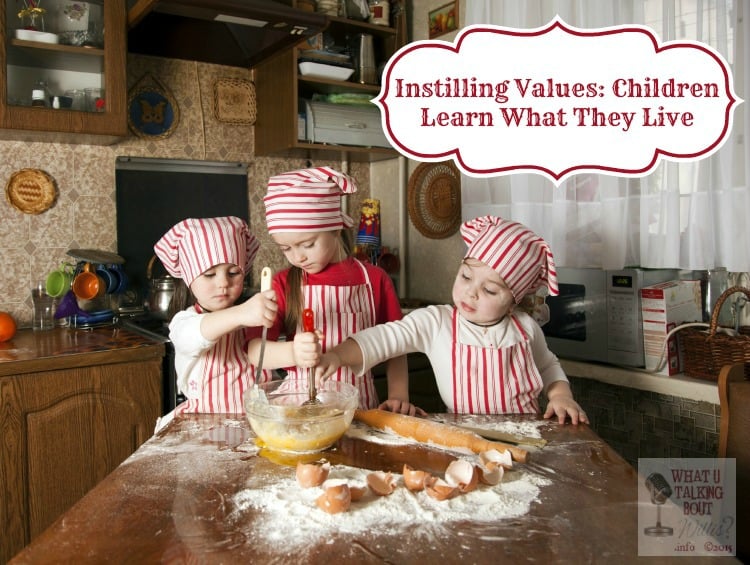Instilling Values: Children Learn What They Live

Instilling Values: Children Learn What They Live
Instilling values in your children is one of the most important things parents do. Many parents, like myself though, are not sure how to go about it. A key principle to think about is: children learn what they live.
Here are some tips on instilling values with this philosophy in mind.
1. Criticism
Psychologists say that kids who grow up with criticism tend to grow up condemning others. Most of us don’t want our kids to learn criticism of others as a value. So what can we do?
We’ve all had moments like this: Your child is playing, and accidentally knocks over something, say a cup of juice. You respond with exasperation and comment about his or her “clumsiness”. You may continue, lecturing your child on how not to be so clumsy while you clean up the mess, griping about how much trouble it is because you were right in the middle of fixing dinner.
If you could stop and rewind, it would be ideal to rewind to the place where you uttered the first critical comment. Just say though it pops out of your mouth before you can stop it (and that’s often how it works), then stop before continuing to criticize. Apologize for the comment, assure your child that he is not clumsy, and point out that you’ve spilled things, too. He can help you clean it up, and instead of griping, cheerfully show him how easy it was to “correct” that mistake. No harm has been done.
2. Prioritize Your Values
Is going to church important to you? Are exercise and fitness things you value? What about individuality and independence? Is it important to you that people be kind to each other? If so, prioritize these things. Let your child see what these values look like in action, and your child will be more likely to emulate what he sees you doing. Living your values is a sort of “how to” tutorial for your child, who may not otherwise know what living out these values looks like. If you are able to lay the foundation; you may find it is easier for them to follow.
3. Include Your Kids
Kids can feel alienated if their viewpoints, feelings, sensibilities, and opinions are seldom considered. Impress on your kids that their participation in the family is important and valuable. This helps them take their responsibilities to the family more seriously, especially if they feel appreciated.
If your kids are included in the joys as well as the responsibilities, it helps balance all those tasks that are necessary. Then they may be more likely to be actively contributing members of their own families and communities as adults. Again, children learn what they live.
4. Reflecting
Looking back with my own kids, I remember not making them do things that I did not like to do when I was a child. This was a big mistake on my part; as it made it difficult to correct my ways when they got older. For example, I never made them take part in doing the laundry (well I take that back). One time I had my oldest do the laundry and most of it turned pink. Instead of having him do it again, with my utmost supervision, I just let it go.
When he went into the Marine Corp, he had to learn to do it by himself. He figured it out and was able to do it, but I couldn’t help but thinking why didn’t I make that a priority.
Instilling values in your children is not meant as a punishment; but rather a tool to help them when they are young adults. They may not like it when they are younger, but they will appreciate it when they are older.
What's Your Reaction?
Newly middle-aged wife of 1, Mom of 3, Grandma of 2. A professional blogger who has lived in 3 places since losing her home to a house fire in October 2018 with her husband. Becky appreciates being self-employed which has allowed her to work from 'anywhere'. Life is better when you can laugh. As you can tell by her Facebook page where she keeps the humor memes going daily. Becky looks forward to the upcoming new year. It will be fun to see what 2020 holds.



